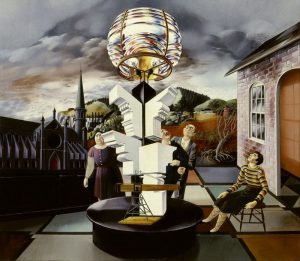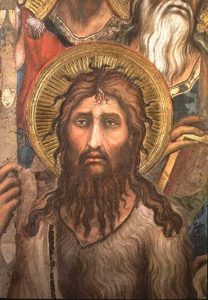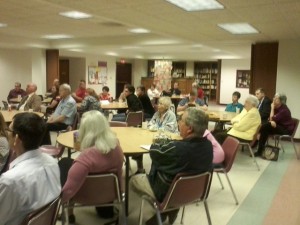 Do any of you know the story of Tubby the Cocker Spaniel? Well . . . remember Tubby’s name. We’ll come back to him, but first let’s put today’s gospel lesson in perspective.
Do any of you know the story of Tubby the Cocker Spaniel? Well . . . remember Tubby’s name. We’ll come back to him, but first let’s put today’s gospel lesson in perspective.
This lesson picks up where last week’s lesson ended. You’ll recall that Jesus is sending the twelve out to do missionary work. “Go,” he tells them “to the lost sheep of the house of Israel . . . proclaim the good news . . . cure the sick, raise the dead, cleanse the lepers, cast out demons.”[1] In last week’s lesson, he warned them that this was not going to be easy, that they would face opposition. In this week’s reading, he continues in that vein and ups the ante, increases the volume: it won’t just be difficult, he says, it’s possibly going to be deadly!
There won’t just be arguments at the Thanksgiving table; there will be fights! Your father or your mother, your sister or your brother . . . they won’t just disagree with you; they will be your enemies; they will try to kill you. “Do not think that I have come to bring peace to the earth; I have not come to bring peace, but a sword.”[2]
 Our gospel lesson is the shortened version of Jesus’ commission to the twelve as he sends them out to do missionary work. As he continues with their instructions he tells them, “I am sending you out like sheep into the midst of wolves; so be wise as serpents and innocent as doves,”
Our gospel lesson is the shortened version of Jesus’ commission to the twelve as he sends them out to do missionary work. As he continues with their instructions he tells them, “I am sending you out like sheep into the midst of wolves; so be wise as serpents and innocent as doves,” “As Jesus was walking along, he saw a man called Matthew sitting at the tax booth; and he said to him, ‘Follow me.’ And he got up and followed him.”
“As Jesus was walking along, he saw a man called Matthew sitting at the tax booth; and he said to him, ‘Follow me.’ And he got up and followed him.” A few years ago, at my former parish, we had a Sunday school presentation in which each of the kids was to recite a verse of Scripture. On little guy came up and just stood there, shuffling his feet and looking very uncomfortable; he just couldn’t remember his line… His mother was in the front row to prompt him. She gestured and formed the words silently with her lips, but it did not help. Her son’s memory was blank. Finally, she leaned forward and whispered the cue, “I am the light of the world.” The child beamed and with great feeling and a loud clear voice said, “My mother is the light of the world.”
A few years ago, at my former parish, we had a Sunday school presentation in which each of the kids was to recite a verse of Scripture. On little guy came up and just stood there, shuffling his feet and looking very uncomfortable; he just couldn’t remember his line… His mother was in the front row to prompt him. She gestured and formed the words silently with her lips, but it did not help. Her son’s memory was blank. Finally, she leaned forward and whispered the cue, “I am the light of the world.” The child beamed and with great feeling and a loud clear voice said, “My mother is the light of the world.” Human conversation
Human conversation When I was a kid growing up first in southern Nevada and then in southern California, the weeks leading up to Christmas (we weren’t church members so we didn’t call them “Advent”) were always the same. They followed a pattern set by my mother. We bought a tree and decorated it; we set up a model electric train around it. We bought and wrapped packages and put them under the tree, making tunnels for that toy train. We went to the Christmas light shows in nearby parks and drove through the neighborhoods that went all out for cooperative, or sometimes competitive, outdoor displays. My mother would make several batches of bourbon balls (those confections made of crushed vanilla wafers and booze) and give them to friends and co-workers. Christmas Eve we would watch one or more Christmas movies on TV, and early Christmas morning we would open our packages . . . carefully so that my mother could save the wrapping paper. Then all day would be spent cooking and watching TV and playing bridge. After the big Christmas dinner, my step-father and I would do the clean up, my brother and my uncle would watch TV . . . and my mother would sneak off to her room and cry. You see . . . no matter how carefully we prepared, no matter how strictly we adhered to Mom’s pattern, something always went wrong. We never got it right; Christmas never turned out the way my mother wanted it to be.
When I was a kid growing up first in southern Nevada and then in southern California, the weeks leading up to Christmas (we weren’t church members so we didn’t call them “Advent”) were always the same. They followed a pattern set by my mother. We bought a tree and decorated it; we set up a model electric train around it. We bought and wrapped packages and put them under the tree, making tunnels for that toy train. We went to the Christmas light shows in nearby parks and drove through the neighborhoods that went all out for cooperative, or sometimes competitive, outdoor displays. My mother would make several batches of bourbon balls (those confections made of crushed vanilla wafers and booze) and give them to friends and co-workers. Christmas Eve we would watch one or more Christmas movies on TV, and early Christmas morning we would open our packages . . . carefully so that my mother could save the wrapping paper. Then all day would be spent cooking and watching TV and playing bridge. After the big Christmas dinner, my step-father and I would do the clean up, my brother and my uncle would watch TV . . . and my mother would sneak off to her room and cry. You see . . . no matter how carefully we prepared, no matter how strictly we adhered to Mom’s pattern, something always went wrong. We never got it right; Christmas never turned out the way my mother wanted it to be. Two things happened last Saturday.
Two things happened last Saturday. I have a friend whose face I have seen only in photographs. We have never been in the same room; we have never shaken hands; we have never spoken. Nonetheless, I have considered this person a friend for many years. We met (if that’s the right word) through a listserve of Episcopalians and Anglicans many years ago and continued our friendship when most of that group migrated to Facebook. A couple of months ago, I noticed that my friend had stopped posting to Facebook. I tried to contact them
I have a friend whose face I have seen only in photographs. We have never been in the same room; we have never shaken hands; we have never spoken. Nonetheless, I have considered this person a friend for many years. We met (if that’s the right word) through a listserve of Episcopalians and Anglicans many years ago and continued our friendship when most of that group migrated to Facebook. A couple of months ago, I noticed that my friend had stopped posting to Facebook. I tried to contact them


